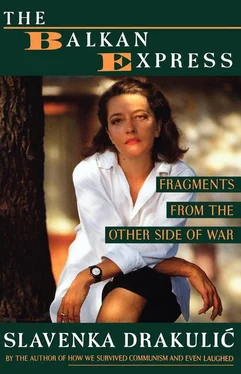Slavenka Drakulić - The Balkan Express - Fragments from the Other Side of War
Здесь есть возможность читать онлайн «Slavenka Drakulić - The Balkan Express - Fragments from the Other Side of War» весь текст электронной книги совершенно бесплатно (целиком полную версию без сокращений). В некоторых случаях можно слушать аудио, скачать через торрент в формате fb2 и присутствует краткое содержание. Город: New York, Год выпуска: 1993, ISBN: 1993, Издательство: W. W. Norton & Company, Жанр: Биографии и Мемуары, Публицистика, на английском языке. Описание произведения, (предисловие) а так же отзывы посетителей доступны на портале библиотеки ЛибКат.
- Название:The Balkan Express: Fragments from the Other Side of War
- Автор:
- Издательство:W. W. Norton & Company
- Жанр:
- Год:1993
- Город:New York
- ISBN:0-393-03496-8
- Рейтинг книги:4 / 5. Голосов: 1
-
Избранное:Добавить в избранное
- Отзывы:
-
Ваша оценка:
- 80
- 1
- 2
- 3
- 4
- 5
The Balkan Express: Fragments from the Other Side of War: краткое содержание, описание и аннотация
Предлагаем к чтению аннотацию, описание, краткое содержание или предисловие (зависит от того, что написал сам автор книги «The Balkan Express: Fragments from the Other Side of War»). Если вы не нашли необходимую информацию о книге — напишите в комментариях, мы постараемся отыскать её.
The Balkan Express: Fragments from the Other Side of War — читать онлайн бесплатно полную книгу (весь текст) целиком
Ниже представлен текст книги, разбитый по страницам. Система сохранения места последней прочитанной страницы, позволяет с удобством читать онлайн бесплатно книгу «The Balkan Express: Fragments from the Other Side of War», без необходимости каждый раз заново искать на чём Вы остановились. Поставьте закладку, и сможете в любой момент перейти на страницу, на которой закончили чтение.
Интервал:
Закладка:
The letters that appeared in the press were bitter: she was accused of cynicism and lack of empathy, but most of all, for equating the victim with the executioner. In the eyes of the public, she had become a traitor, a ‘fifth columnist’. This Marta couldn’t understand, she couldn’t understand that every occasion for public discussion, for intellectual nuances or plain differences of opinion had suddenly been poisoned, usurped, swept away by the war. Under the everyday threat of shelling (between 15 September and 4 November there were forty air-raid alarms in Zagreb, the front line was less than twenty miles away, the presidential palace in the middle of the old city was hit as well as villages on the outskirts of Zagreb) things became black and white. Moreover, she was perceived as a person who wrote from Olympian heights, as someone who had other options, who could go somewhere else if she wanted, while the majority couldn’t even think of an alternative. So the message against her in the media was: Go! Get out of this city and don’t come back!
It was hard to find a single person to defend her position even among the people who knew her. ‘You agree that her apartment should be taken away from her, don’t you?’ I heard one of her acquaintances saying. In fact this was not the first time that her apartment had been mentioned; one of the hate-letters published in a magazine mentioned that she lived in a ‘big, luxurious apartment in the very centre of the city’, as if by living there she’d committed a crime in itself, or as if, having been proclaimed as ‘enemy of the people’, she didn’t ‘deserve’ such an apartment at all.
Now, the story of her apartment is the story of the majority of apartments in this country: they were communal property, state owned. But because the party ruled in the name of the people, it also meant they were, in a broader sense, owned by the people – nominally, at least. In short, these apartments were rented through state-owned companies and in reality no one could take them from a person who had a certain type of contract. One’s children too were entitled to the same rights. Marta, in fact, had inherited the apartment from her father. The proposal I heard from her acquaintance was thus by no means illogical: she was only talking about the typical bolshevik method of stripping her of the right to live there, similar to the method of nationalization or confiscation of property belonging to ‘enemies of the state’ after World War II and the communist revolution in Yugoslavia. This was the mood of the people about her ‘case’.
Confronted by such a violent onslaught Marta was frightened. She finally understood that the war was not happening simply to others, but to her as well and that this was the way she was experiencing it. Words too, she learned, could become a dangerous weapon. As she had already received a six-month grant to teach in France, she left soon after for Paris.
Time passed but ‘Marta’s case’ didn’t disappear under the welter of troubles that now hit Croatia. Periodically her name would pop up here and there in articles discussing, listing or enumerating traitors, dissidents, enemies, cowards and so on. Obviously, this purge of ‘internal enemies’ was an aspect of the war in the city and it was related to something which no one would admit to in words – revenge. Many apartments left by such people were broken into, especially those left behind by Federal Army officers, but not only by countless refugees, but by ordinary, self-righteous individuals who saw a way to solve the problems of their own inadequate living conditions and didn’t see anything wrong in usurping the apartment of an ‘enemy’.
A couple of months after she left, an article by a popular woman columnist appeared discussing the matter of Marta’s apartment. ‘I am very concerned,’ she wrote sarcastically, ‘that poor Marta – so disgusted by Croatia that she had to leave for Paris – might now be permitted to buy a communal apartment from that same disgusting republic. As an ambassador’s daughter, ambassador’s wife and ambassador’s sister, Marta was used to getting everything from Yugoslavia for free. Perhaps it would be good therefore to give her the apartment for free too, so she doesn’t report us to the Helsinki Tribunal.’ The columnist (who knew her personally) concluded that greedy Marta had acquired the apartment at the people’s expense.
Reading this, I realized that the information about Marta’s attempt to buy off the apartment from the state had come from Ana. Not only did Ana live in Marta’s apartment, so she was bound to know about it, but she also worked for the newspaper in which the article had appeared. However, it was very hard to believe that Ana had any reason to give away this type of information, that she would have any reason to do it at all. I then asked around and discovered that Marta had come back from Paris during the Easter holidays to arrange to buy the apartment when the new law permitting that possibility was passed. After living in her apartment for more than a year free and because Ana and her boyfriend were now making decent money as journalists, Marta had asked them if they’d be willing to pay a rent by monthly installments according to the new economic prices set by the government, which wouldn’t cost them more than renting another apartment.
On the telephone, Ana didn’t say a word. But the first thing next morning she went to the special commission of the Croatian Parliament (the official owner of the apartment) denouncing Marta for not even living in the apartment she was attempting to buy, suggesting that she should be denied the right to buy it because she was a war profiteer of a kind and that the apartment should in fact be taken from her. Perhaps Marta should be given a smaller apartment to buy, she added, not the big one she inherited from her father. As for herself, Ana didn’t claim the right to the apartment directly, but she did think she and her boyfriend deserved something. I don’t know if Ana mentioned the word ‘reward’ but this is what she meant.
Having heard what Ana had done, Marta went to a lawyer and started proceedings, first to expel Ana and her boyfriend from her apartment and second, to assert her right to buy it under the new legislation. The problem is, however, that until Ana withdraws the claim she lodged with the government Marta won’t be able to buy the apartment and with an ongoing war, this could take forever. It also means that Ana could continue living in Marta’s apartment (which she is doing) until the case is legally resolved. In the meantime, when Marta went to the same Parliament commission, she found that the file containing her application to buy the apartment had simply vanished, together with the rest of her documents!
In essence, Ana has tried to steal the apartment. Not for herself- and this is the point, because this is where her sense of ‘justice’ comes in – but so that she can give it back to the state, to ‘the people’. She is doing a favour to the state by reporting on a person of communist background, and a traitor too, who doesn’t deserve to have such a luxurious apartment. But this tiny, timid, diligent reporter with a special sense of justice and duty has demonstrated a sound instinct for the realities of war too; in her judgement, this has been the perfect chance literally to take the law into her own hands. Never mind the fact that the apartment was entrusted to her or that she didn’t pay a rent for it. At the ‘right’ moment, when Ana saw that it was possible to act according to the new rules of the game, she was able to abandon any moral scruples. Indeed, when she saw the chance for a girl like herself from the provincial proletariat to get something for nothing, she didn’t hesitate. Given the opportunity, aren’t others – refugees, soldiers, ordinary citizens, even a neighbour in the same building – doing the same? The newspapers are full of stories of this kind, people talk about it in local bars and supermarkets, in every neighbourhood there are similar cases. And what happens to them? Nothing. So Ana must have thought, Why not me? She didn’t see herself as someone who would denounce people in an attempt to profit by it, she didn’t see that she was taking it upon herself to judge who should be left without an apartment and for what reason. But most important of all, Ana wouldn’t have dared do what she did if Marta hadn’t been proclaimed a ‘traitor’. In this way, Ana saw no harm done: the people give, the people take away.
Читать дальшеИнтервал:
Закладка:
Похожие книги на «The Balkan Express: Fragments from the Other Side of War»
Представляем Вашему вниманию похожие книги на «The Balkan Express: Fragments from the Other Side of War» списком для выбора. Мы отобрали схожую по названию и смыслу литературу в надежде предоставить читателям больше вариантов отыскать новые, интересные, ещё непрочитанные произведения.
Обсуждение, отзывы о книге «The Balkan Express: Fragments from the Other Side of War» и просто собственные мнения читателей. Оставьте ваши комментарии, напишите, что Вы думаете о произведении, его смысле или главных героях. Укажите что конкретно понравилось, а что нет, и почему Вы так считаете.












